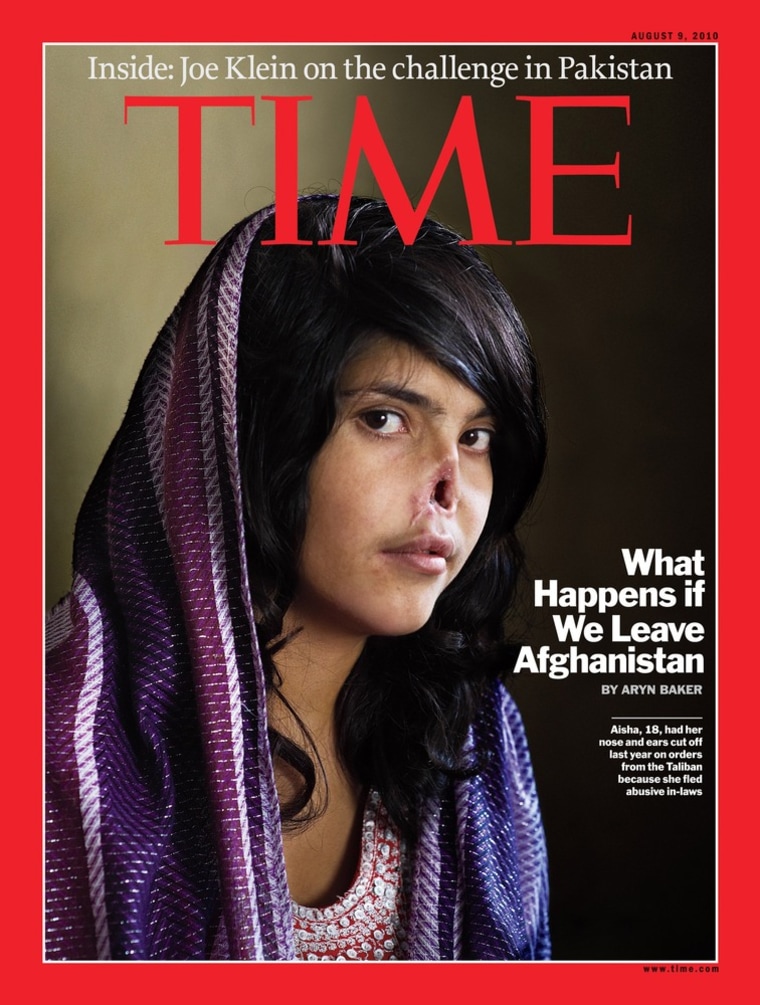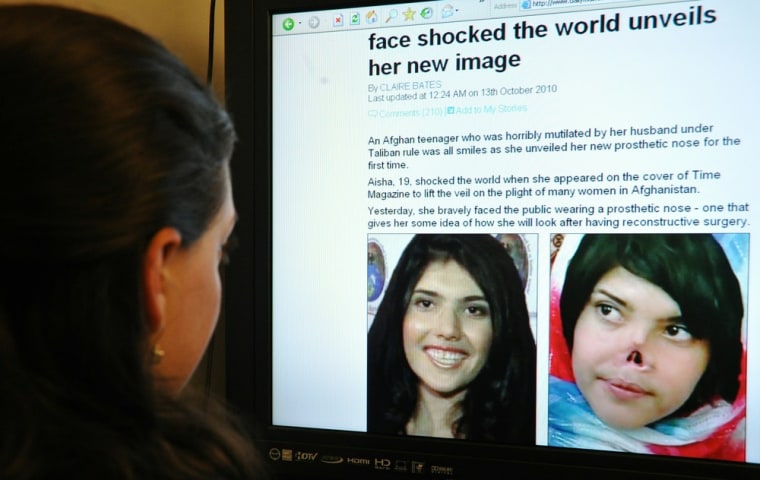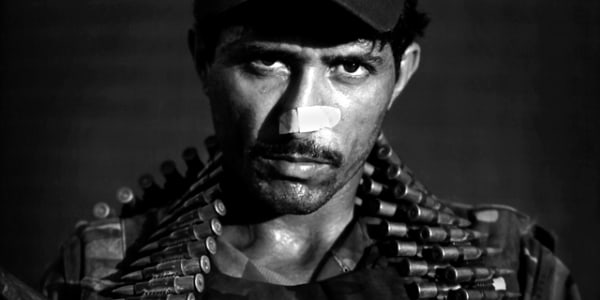The only suspect arrested in the case of a woman mutilated by having her nose and ears cut off has been released, according to local Afghan officials and the woman’s father, in a move that angered human rights advocates as well as the woman’s family.
The suspect, who had confessed to taking part in the mutilation, was released with the knowledge of the provincial governor, said the provincial attorney, Ghulam Farouq.
Mr. Farouq, gave two different reasons for the release of Mr. Suleiman, who was one of several family members involved in the girl’s mutilation: that there was no one in Afghanistan to press the case against him — because the victim is now in the United States — and that he did not cut off the girl’s nose himself.
“If someone commits a crime, then nobody else should be punished or arrested,” said Mr. Farouq. “The crime was committed by his son, Quadratullah, and this innocent guy was imprisoned for 11 months,” he said.

The governor of Uruzguan could not be reached for comment.
Several involved in crime
However, the woman’s father and women’s rights advocates who interviewed the girl extensively about the experience, said that several men were involved in the crime in the village of Chora in a rural and remote area of Uruzguan Province where the Taliban hold sway and that one of them was Mr. Suleiman, who was caught when he came to the district center to do errands.
“The man they let out, he was Aisha’s father-in-law,” said her father, Mohammedzai, his voice cracking as he spoke. “He was there at the time when they chopped off her nose and did the cruelty to her. He was one of the culprits and should have been punished, but the government released him”
“We don’t know who released him,” he said. “We don’t know at all. It’s either government weakness or our weakness. We don’t have money to pay the government and we don’t have someone in the government to support us.”
Slideshow 10 photos
Soldiers of the Afghan National Army
The other perpetrators have not been apprehended because the area where they live is held by the Taliban and the police cannot enter it, the police have said. Her husband, Quadratullah, who is a Taliban commander, fled to Pakistan or goes back and forth, human rights advocates said.
The woman, Bibi Aisha, came to national attention when Time Magazine, in August, 2010, used a photo of her on its cover, with the suggestion that this was what would happen if the West left Afghanistan. A child bride, Aisha (Bibi is an honorific; Aisha asked that her family name be withheld) had fled her arranged marriage to a Taliban fighter, but was captured and returned to the village, where her husband, father-in-law and two brother-in-laws carried out the mutilation, after approval by the local Taliban mullah, who was also present when her nose was cut off, said her father, who added that Suleiman, her father-in-law, was one of the people who held down his daughter while her husband cut her.
Left for dead
Left for dead, she said, she then fled to the safety of a women’s shelter in Kabul run by Women for Afghan Women, which publicized her plight a year later.
With the help of non-profit women’s groups and the American Embassy she later went to the United States and a foundation offered to fund reconstructive surgery to rebuild her nose. However, the operation has yet to be done because doctors felt she was still too emotionally distraught to handle the multiple surgeries that would be necessary as well as the long healing period, said Manizha Naderi, who runs Women for Afghan Women, which has also helped organize her care in the United States. She is now living in New York and learning English, but has been emotionally distressed, although she is gradually stabilizing, said Ms. Naderi.
“When somebody goes through violence like this there’s trauma afterwards,” said Ms. Naderi. “For a long time she had nightmares that they were coming after her again and cutting her nose all over again.”
“It’s very bad he’s out,” she said. “It sends out a message that it doesn’t matter how violent or how cruel the crime is; if you have connections or money you can get out on the street. It just shows that the justice system is very weak and corrupt,” she said.
Her Afghan lawyer, Niamatullah Sarabi, said he had not been informed of the man’s release and that the case he had brought against Mr. Suleiman had gone nowhere.
Human rights advocates said that the release demonstrated the depth of the problems in the justice system.
“It is a very outrageous act by the justice sector that a case that was highly publicized in Afghanistan and when only one perpetrator was arrested,” that the person was released, said Nader Naderi, the deputy director of the Afghan Independent Human Rights Commission.
“Impunity has always been expected” in the justice sector, he said.
“And releasing him is a betrayal of the women who seek justice and of the police who tried to arrest them,” added Mr. Naderi.
The provincial attorney, Mr. Farouq, who said he was new to Uruzgan Province, said that since he had arrived a few months ago, Mr. Suleiman insisted that he was not guilty. “It was a huge cruelty to keep him for 11 months in prison,” he said.
“I asked my colleagues if he was innocent and the colleagues said he was not present at the incident, he was outside the country at the time and was arrested when he returned in order to help the police and attorney to arrest his son.”
Abdul Waheed Wafa and Sangar Rahimi contributed reporting.
This story,"Suspect Freed in Afghan Mutilation Case," originally appeared in The New York Times.

